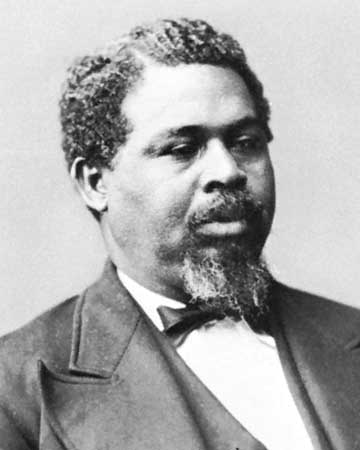Robert Smalls Civics Lesson
Robert Smalls/Frederick Douglass
The Quest For Freedom From Slavery
Just as Robert Smalls took bold action in his quest for freedom from slavery, leading abolitionist Frederick Douglass used bold words to advocate freedom from slavery. About ten years before Smalls’ daring escape from bondage, Douglass, delivered the Independence Day address in Rochester, New York on July 4, 1852. Douglass had been born a slave on a Maryland plantation thirty-five years earlier but escaped as a late teen to Massachusetts. He devoted the rest of his life to slavery’s abolition, renown for his searing oratory that America be held accountable for its original sin. In his Fourth of July speech, Douglass elaborated his moral argument with a graphic question.
What, am I to argue that it is wrong to make men brutes, to rob them of their liberty, to work them without wages, to keep them ignorant of their relations to their fellow men, to beat them with sticks, to flay their flesh with the lash, to load their limbs with irons, to hunt them with dogs, to sell them at auction, to sunder their families, to knock out their teeth, to burn their flesh, to starve them into obedience and submission to their masters?
He concluded his oration with challenging words.
What, to the American slave, is your Fourth of July? I answer: a day that reveals to him, more than all other days in the year, the gross injustice and cruelty to which he is the constant victim. To him, your celebration is a sham: your boasted liberty, an unholy license; your national greatness, swelling vanity . . . There is not a nation of savages, there is not a nation on the earth guilty of practices more shocking and bloody than are the people of the United States at this very hour.
It takes courage to make bold statements or take bold action when you’re dealing with controversial or sensitive issues, particularly when they concern wrongdoing on the part of others. The boldness of Douglass and Smalls made a big difference. Like them, you can boldly — and effectively — demonstrate boldness when you resolve to be:
STRONG
The examples of Smalls and Douglass may be a difficult one for you to follow. You may shy away from confrontation and choose the path of diplomacy. But in those moments when boldness is called for, speak from your soul. If your advocacy flows from your heart, the passion of the points you make will uplift your audience. Accept the fact that sometimes the truth is difficult for others to accept — it may cause discomfort, even pain; declare it anyway. Your bold voice just might be what’s needed to spur change.
STRATEGIC
Neither Smalls nor Douglass advocated — as some of his peers did — violence in the battle for freedom from slavery. Their initiatives were strategic. Douglass waged war with his words, preaching messages designed to pierce the heart and soul of an anguished nation. Smalls laid out a surreptitious plan of escape and executed it under cover of darkness. Let your pursuits of goals be strategic. Don’t fight your battle with physical weapons to inflict arms and legs. Wage war with moral weapons: deploy your words and writings to move hearts and minds. Without guns and fists and with a strong and strategic approach, you will certainly win over friends and neighbors, and, as Douglass and Smalls did, you just might bring freedom to others.

